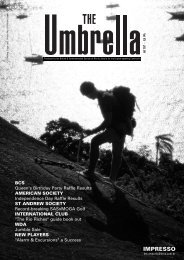4corners - Rio Societies
4corners - Rio Societies
4corners - Rio Societies
Create successful ePaper yourself
Turn your PDF publications into a flip-book with our unique Google optimized e-Paper software.
Robert Schumann: Concert for Piano and<br />
Orchestra, Op. 54<br />
Stephen Bishop, piano<br />
BBC Symphony Orchestra.<br />
Conductor: Sir Colin Davis<br />
GOOD LISTENING<br />
WWW.GOODLISTENING.COM.BR<br />
At a time when Brazil has elected its first<br />
woman Head of State, it is perhaps appropriate<br />
to reflect on the ascent of the woman<br />
as professional – and in the realm of music,<br />
the outstanding figure from the 19th century<br />
was Clara Schumann (née Wieck).<br />
Recognized early on as an outstanding concert<br />
pianist, she was also a composer in her<br />
own right – but little recognized for it; she<br />
married a very gifted composer at 21, and<br />
was a widow with seven children at 37.<br />
Nevertheless, she managed the manifold<br />
problems of career, household, children and<br />
grandchildren, was a devoted teacher, a<br />
lifelong friend to Brahms, and the main promoter<br />
and editor of Robert Schumann’s<br />
works – over an influential career which<br />
spanned some 60 years.<br />
Upbringing: becoming an artist<br />
Clara Josephine Wieck was born in Leipzig<br />
in 1819. Her father Friedrich Wieck had<br />
started a new career there in 1815 (the year<br />
of Waterloo!) as a piano teacher, and as<br />
owner of a piano store and music shop. He<br />
chose the time and place well, for Leipzig<br />
was a metropolis with a strong commercial<br />
tradition, but one in which musicians had<br />
a favoured status. In 1816, Wieck married<br />
his 19-year-old student, Marianne Tromlitz,<br />
who was a fine pianist and excellent soprano.<br />
Clara was the second of five children,<br />
but shortly after the birth of the last in<br />
1824, Marianne separated from Wieck, and<br />
from age 5 Clara was brought up in her<br />
father’s house, where he used all his skills<br />
and contacts to train her to be a great<br />
artist. Curiously, Clara did not speak, even<br />
single words, until she was over 4 years<br />
old, though she had no difficulty in memorizing<br />
and playing music. Her training at<br />
first did not include reading music, but<br />
concentrated on playing by ear, learning<br />
chords and progressions, composing and<br />
improvising. She developed her posture at<br />
the keyboard (with all the arm and wrist<br />
relaxed, strength coming from the back<br />
muscles), and her father emphasized musical<br />
phrasing, and producing a singing tone<br />
(he even required his students to take<br />
singing lessons). By the time she was<br />
seven she was at the piano three hours a<br />
day – one hour for a lesson, and two for<br />
practice. Then there was the daily walk (of<br />
Clara Schumann: pianist and<br />
woman extraordinary – Part I<br />
several hours – a practice she kept until<br />
the end of her life), while schooling with<br />
special tutors was squeezed into the<br />
remaining hours.<br />
The Wieck’s became the favourite gatheringplace<br />
for musicians and visitors in Leipzig,<br />
and by the time she was 9 she was taking<br />
a full part in the musical gatherings.<br />
The battle for Clara<br />
Robert Schumann was born in 1810 in<br />
Zwickau, some 40 miles south of Leipzig, a<br />
latecomer into a well-to-do family of booksellers,<br />
writers and publishers. His father died<br />
when he was 16, and his mother decided to<br />
prepare him for the law, studying in Leipzig<br />
– but there he spent all his time with music,<br />
listening, studying and playing the piano.<br />
Handsome, charming, gifted, finally at 20 he<br />
appealed to his mother to let him devote<br />
himself to music; his mother in turn<br />
appealed to Friedrich Wieck, who said that<br />
if Robert could discipline himself and follow<br />
his teaching, in 3 years he could turn<br />
him into one of the greatest pianists alive.<br />
So in 1830 (when he was 20 and Clara 11)<br />
he came to live in the Wieck household<br />
where, after studying during the day, at<br />
night he would lead Clara and her younger<br />
brothers in fun and games, bringing sunshine<br />
to the disciplined household.<br />
When Clara was 12, her father took her on her<br />
first tour, travelling by stage coach, initially<br />
in Germany but ending up in Paris. She received<br />
glowing reviews everywhere she went<br />
– “under her fingers the piano takes on<br />
colour and life” – and her diary (in which<br />
her father also wrote) provides details of<br />
all this. They stayed away for nine months!<br />
But then the paths ran parallel – Clara<br />
continued her preparation for a concert<br />
career with her father; Schumann lived in<br />
rooms with friends and founded a musical<br />
journal. But shortly after Clara’s 16th birthday,<br />
Robert and Clara admitted their pas-<br />
MARTIN HESTER sion for one another, had their first kiss,<br />
and met whenever they could.<br />
Although they hoped that Wieck would<br />
bless their relationship, they were taken<br />
aback when he erupted in fury – and in<br />
1836 began the long battle for Clara.<br />
Wieck forbade Clara to see Robert, took<br />
her away on concert tours – and for nearly<br />
a year and a half they did not see each<br />
other or communicate in any way. On<br />
those tours she achieved extraordinary<br />
success, while Robert threw himself into<br />
composing (and an active social life).<br />
Some of Schumann’s most impassioned<br />
piano works date from this period.<br />
A stay in Vienna in the winter of 1837-38<br />
was a triumph for Clara – her playing created<br />
a sensation, box offices were<br />
stormed for tickets to her concerts, restaurants<br />
served “torte à la Wieck” and the<br />
money rolled in. Clara received the highest<br />
honour possible from the Empress.<br />
Finally in late 1838 Schumann and Clara abandoned<br />
hope of getting Wieck’s permission to<br />
marry, and started a lawsuit – they both had<br />
to appear in person in Leipzig – but Clara<br />
found that her father’s house was no longer<br />
open to her – she was locked out, together<br />
with all her possessions, including her clothing,<br />
music, piano, and even her childhood<br />
diary. Now began a difficult year; Clara went<br />
to live with her mother in Berlin, while Robert<br />
and Wieck battled in the courts. As their<br />
separation continued into 1840, Robert’s<br />
longing was expressed in some wonderful<br />
songs (nearly 150 all told). But in August<br />
1840 the Leipzig court ruled entirely in their<br />
favour and they married in September.<br />
Married life and music<br />
Finally Robert and Clara began a happily<br />
married life, in which there was not only<br />
physical attraction and mutual emotional<br />
dependence: their musical and creative needs<br />
complemented each other. Clara kept a<br />
marriage diary, Robert kept the accounts, and<br />
their first child Marie was born in 1841.<br />
Robert’s fame as a composer grew, and<br />
encouraged by Clara, he began to enlarge<br />
the scope of his composing, from piano<br />
and chamber pieces to large orchestral<br />
works. The first movement of his Piano<br />
Concerto in A minor was written at that<br />
time, but was not premiered by Clara in<br />
concert until 1845, after he had added<br />
another two movements. Nevertheless, we<br />
can regard it as a reflection of the happiness<br />
and progress of the Schumanns at<br />
that time, after such difficulties – and we<br />
can imagine we are hearing her play it!<br />
But that is only the end of the beginning<br />
as far as Clara’s life is concerned...<br />
Good Listening!<br />
13






